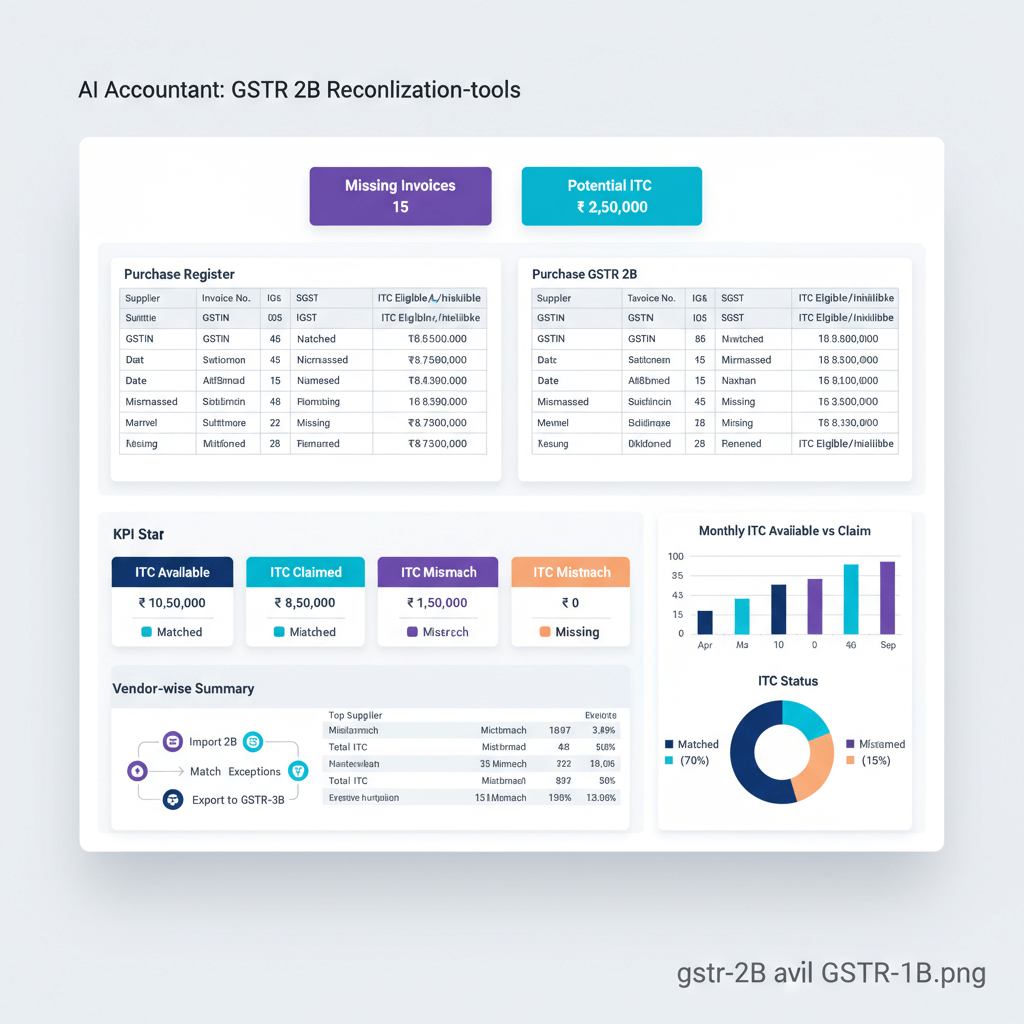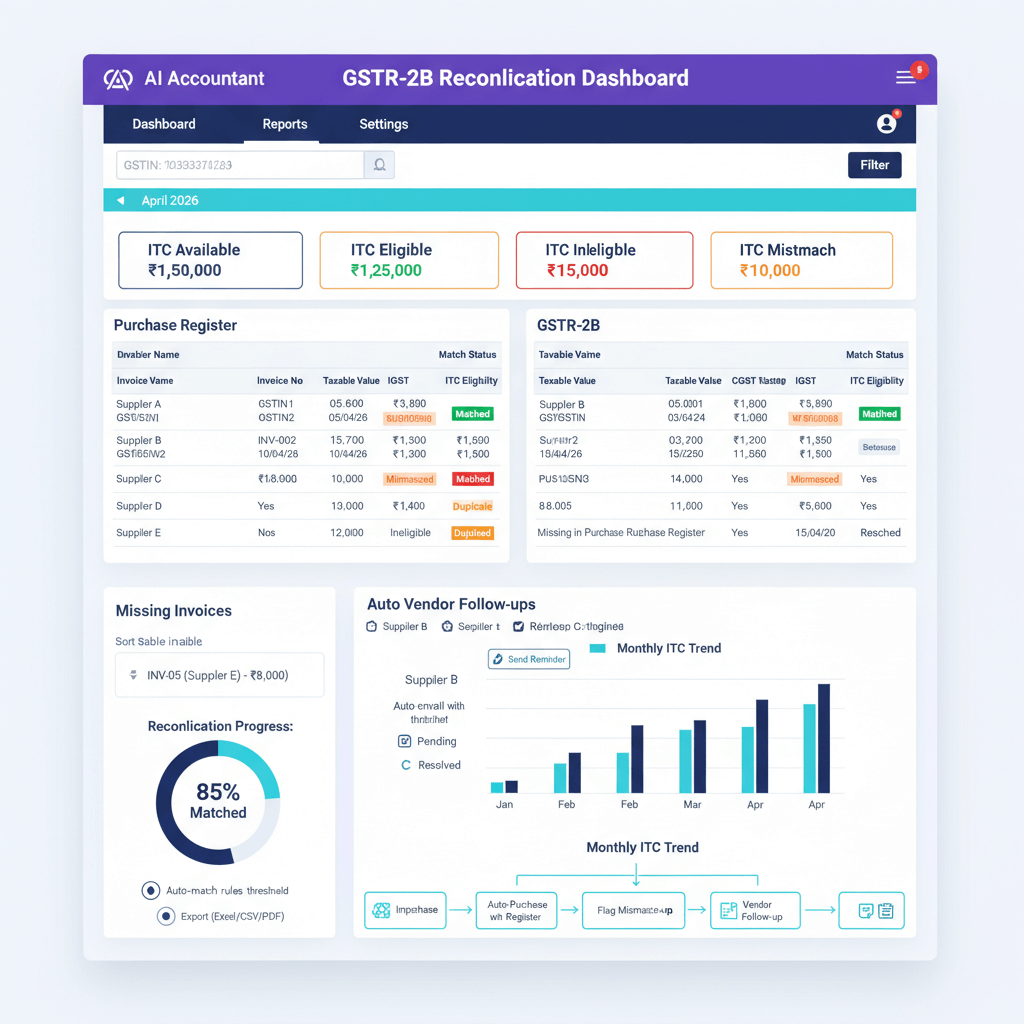Key Takeaways
- Automated notice handling reduces response time from weeks to hours.
- AI-powered document intelligence extracts data from PDFs, Excel, and scans at scale.
- Smart data mapping ensures transactions align with ledgers, GST codes, and invoices.
- Continuous compliance monitoring keeps books audit-ready at all times.
- Real-time transaction classification prevents errors that trigger notices.
- Proactive risk flags and health scores identify issues before notices arrive.
- Integration with Tally, Zoho Books, and other systems enables seamless data flow.
- Accounting firms can scale services without proportional headcount increases.
- Founders gain peace of mind with instant alerts and rapid response capabilities.
The Growing Problem: More Notices, More Complexity
Tax authorities in India now leverage sophisticated AI systems to cross-reference GST returns, TDS payments, bank transactions, mutual fund data, and property registries. Even a minor classification error can trigger a notice. For SMBs and CA firms, the stakes have never been higher.
- Digital footprints are everywhere: GST filings, TDS reports, and bank statements all feed into AI-powered monitoring platforms like GST reconciliation software automation.
- Data mismatches trigger scrutiny: Misaligned GST and TDS records or timing differences can spark an immediate notice requirement.
- Cross-platform integration: The department’s unified view across financial institutions makes it easy to spot unreported income.
“When notices arrive en masse at year-end, even seasoned finance teams struggle to respond on time.”
Understanding Automated Income Tax Notice Handling
Imagine a digital assistant that ingests your invoices, bank statements, and receipts then organizes them for instant retrieval.
- Document Intelligence: Tools extract and index data from PDFs, Excel sheets, and scanned images via OCR, as detailed in the invoice OCR India guide.
- Smart Data Mapping: Transactions auto-map to ledgers, GST codes, and linked bills, creating a transparent audit trail.
- Continuous Compliance Monitoring: Your books remain audit-ready 24/7, powered by solutions like AI accounting software automation.
How AI Helps Respond to Income Tax Scrutiny Faster
Speed and accuracy are critical when a notice lands. AI tools drastically reduce manual efforts.
- Lightning-Fast Document Retrieval: Instantly pull transaction records, vendor payments, and TDS certificates based on notice criteria.
- Seamless System Integration: Bi-directional sync with Tally, Zoho Books, and other platforms, as outlined in our Zoho Books automation tips.
- Automated Verification: Cross-check amounts and dates across bank statements, ledgers, and invoices simultaneously.
- Structured Response Generation: Generate draft replies tailored to notice types, cutting prep time significantly.
AI Powered Tax Risk Flags: Prevention is Better Than Cure
Don’t wait for the department’s AI to spot issues—leverage similar technology to self-audit.
- Pattern Recognition: Identify unusual cash deposits or TDS mismatches early via data analytics for CAs.
- Anomaly Detection: Compare current transactions to historical and industry benchmarks to flag spikes or inconsistencies.
- Compliance Health Scoring: Ongoing risk scores highlight areas needing attention before filing.
- Early Warning Systems: Predict potential triggers based on your business profile and transaction trends.
“The same AI that flags fake deductions and HRA fraud for the department can safeguard your compliance proactively.”
Classify Transactions for Tax Exposure in Real-Time
Accurate transaction classification is a cornerstone of compliance. Real-time automation prevents mismatches before they happen.
- Intelligent Auto-Tagging: Transactions map to categories by vendor type, amount, and history, powered by intelligent ledger mapping AI India.
- Expense Category Validation: Flags disallowed expenses or missing documentation in real time.
- GST Code Accuracy: Automatically applies updated rate tables based on vendor status and transaction type.
- Disallowance Risk Assessment: Highlights high-risk expenses like entertainment or unregistered vendor payments.
- Real-Time Corrections: Alerts team members immediately for transaction-level fixes.
The New Era of Income Tax Compliance Automation
The shift from manual, spreadsheet-driven processes to continuous automation is transformative.
- Automated Journal Entries: TDS, GST, and expense allocations post automatically—see Zoho Books GST filing automation.
- Real-Time Reconciliation: Continuous bank, TDS, and GST matching via AI reconciliation.
- Intelligent Dashboards: Instant compliance insights on outstanding reconciliations and mismatches.
- Automated Reporting: Statutory, management, and compliance summaries generate as data flows in.
- Integrated Workflow Management: Vendor verification, expense approvals, and document collection follow defined processes.
Why Accountants and Founders Are Adopting Automation Now
Automation is no longer optional—it’s a strategic imperative.
- Scaling CA Firms: Handle 40-50% more clients without extra hires by leveraging AI Accountant case studies success.
- Founder Peace of Mind: Continuous alerts and rapid notice response reduce late-night stress.
- Enhanced Client Service: Offer real-time dashboards and proactive monitoring as premium offerings.
- Competitive Advantage: Faster response times and broader service portfolios set firms apart.
- Stress Reduction: Shift focus from routine processing to strategic advisory, as shown in AI impact accounting jobs India.
FAQ
How can I automate income tax notice responses using AI Accountant?
AI Accountant integrates with your accounting software to ingest transaction data, index relevant documents, and generate draft responses. You can retrieve all required bank statements, invoices, and TDS certificates in minutes, then review a structured reply before submission.
What is document intelligence and how does AI Accountant implement it?
Document intelligence uses OCR and machine learning to extract data from PDFs, Excel sheets, and images. AI Accountant’s engine processes invoices, receipts, and statements, mapping key fields—dates, amounts, vendor names—into your ledger automatically.
Can AI Accountant detect GST-TDS mismatches before filing?
Yes. AI Accountant continuously monitors your GST returns and TDS records, flagging discrepancies in real time. You receive instant alerts for mismatches, allowing corrections prior to filing.
How does smart data mapping improve compliance accuracy?
Smart data mapping links each transaction to the correct ledger account, GST code, and supporting invoice. AI Accountant uses historical patterns and vendor metadata to ensure consistent classification, reducing manual errors.
What are compliance health scores and how are they calculated?
Compliance health scores aggregate risk factors like unreconciled transactions, untagged expenses, and TDS mismatches. AI Accountant benchmarks your data against industry norms and historical performance to generate an ongoing risk rating.
How does real-time classification prevent tax notices?
By auto-tagging transactions as they occur, AI Accountant catches potential errors—incorrect GST rates, unverified expenses, or personal costs in business accounts—and prompts immediate correction, avoiding end-of-year surprises.
Can I integrate AI Accountant with Tally and Zoho Books?
Absolutely. AI Accountant offers bi-directional sync with popular accounting platforms. Data flows securely between systems without manual export-import, ensuring your books stay current and audit-ready.
What role do anomaly detection features play in risk management?
Anomaly detection compares current entries to historical and industry benchmarks. AI Accountant flags unusual patterns—sudden expense spikes or irregular vendor payments—for review, enabling proactive issue resolution.
How does AI Accountant support CA firms in scaling services?
CA firms using AI Accountant handle more clients without proportional staff increases. Routine tasks like data extraction, reconciliation, and notice drafting are automated, freeing CAs to focus on advisory and complex cases.
Is AI Accountant secure for sensitive financial data?
Yes. AI Accountant employs end-to-end encryption and role-based access controls. Your financial documents and transaction records remain protected, with audit logs tracking every user interaction for compliance purposes.
-01%201.svg)





